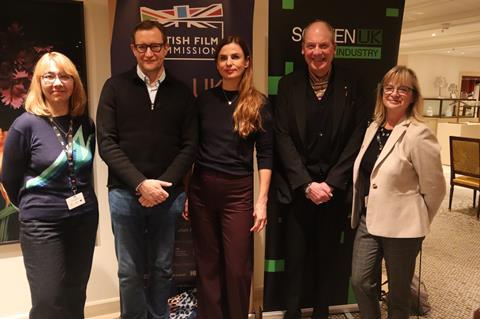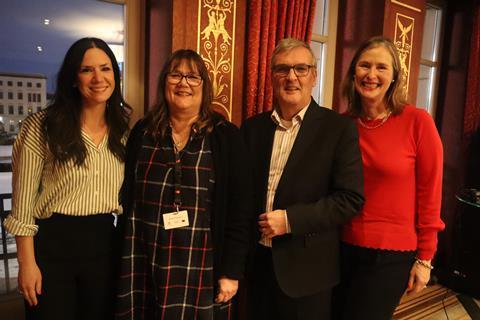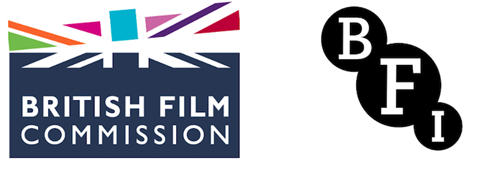The UK is open for business as an international co-producer and full-service production location, said producers and experts in Berlin. It is all thanks to enhancements to the country’s screen sector reliefs.

Leading figures from the UK film and TV industry gathered to showcase to potential international partners the opportunities of both the UK’s Independent Film Tax Credit (IFTC) and the increased tax relief for visual effects in film and high-end TV. The twin panel discussions were organised by the British Film Commission (BFC), British Film Institute (BFI) and business growth agency London & Partners at the Hotel Adlon Kempinski in Berlin on February 14.
Industry figures revealed the “galvanising” effect of the “gamechanger” IFTC, an enhancement of the Audio-Visual Expenditure Credit (AVEC), effective from April 2025. They praised the impact the IFTC has had on raising interest from a greater diversity of financiers, co-production partners and international investors.
“The IFTC has had a galvanising impact and is going to further enhance the opportunities for co-production,” said Adrian Wootton, chief executive of the BFC. “It is attracting more investment internationally from the US, and not just from US studios and streamers. We are seeing a lot more different kinds of US financing.”
Wootton said he felt confident that — thanks to the IFTC and the £7m ($8.8m) per year UK Global Screen Fund set aside by the government’s Department for Culture, Media and Sport (DCMS) to promote international collaboration — “we’re going to see co-production in the UK that we haven’t seen for 20 years”.
The IFTC offers an enhanced 53% credit, which equates to 40% in actual relief for films with an eligible expenditure under £15m ($18.9m), for 80% of UK qualifying spend. To qualify, films must have a UK director, writer or be an official UK co-production. The UK has 12 bilateral co-production treaties and has signed to the European Convention on Cinematic Co-production.
For films over £15m ($18.9m), the standard AVEC has a 34% headline rate, equating to 25.5% in actual relief. Films with a total core expenditure of up to £23.5m ($29.6m) can also choose to opt in for the IFTC, but up to a maximum of 80% of £15m ($18.9m) of the UK qualifying spend.
Both AVEC and the IFTC work on a used-and-consumed basis. “The beauty of doing co-production is you’ve got the ability to attract incentives from all the other territories,” noted Anna Mansi, director of video games and certification at BFI.
Wootton and Mansi were joined on the first panel, chaired by BFI head of international relations Agnieszka Moody, by prolific UK co-producer Mike Goodridge, founder of Good Chaos. “The cost [of production] has gone up but the value hasn’t necessarily gone up,” he said. “[IFTC] is a gamechanger for British cinema.”
Goodridge has several international projects in the works, including Wayne Wang’s Diary Of A Mad Old Man, set to shoot in Japan this summer, with Japanese, Swiss, Italian and US co-producers.
“[The IFTC] is very user-friendly. It’s simple to use and you can charge foreign actors and crew onto that tax credit. I think it’s pretty great,” said Goodridge.
He is also working with Janine Jackowski of German production company Komplizen Film, also a member of the panel, on a project called Kamo, about the early life of Joseph Stalin. The Georgian-language project also includes French, Polish, Hungarian and Georgian producers, and is to be directed by Kornel Mundruczo.
Jackowski produced Pablo Larrain’s 2021 Princess Diana biopic Spencer, starring Kristen Stewart, which shot almost entirely in Germany and was a co-production with the UK’s Shoebox Films. If the IFTC had been available, the film would likely have shot in the UK, revealed Jackowski.
“Our original plan was to shoot nearly all of it in the UK, but we ended up filming just three days there and the rest in Germany,” she said. “With the new possibilities in the UK, it would probably look different now.”

Very special effects
The UK’s VFX sector has also received a boost, with increased tax relief for visual effects in film and high-end TV from April 2025. UK VFX costs will receive a 5% increase in tax relief, for an overall net rate of 29.25%, and are exempt from the overall 80% cap on spending eligible for the main AVEC.
A panel of VFX experts told attendees at the BFI/BFC event that the UK’s competitive tax credits and talent pool has led to an expansion in the sector, which contributes £1.6bn ($2bn) to the economy each year.
“International companies are looking at opening up in the UK now,” said Neil Hatton, chief executive of UK Screen Alliance, who was joined on the panel by Helena Mackenzie, Film London’s head of inward investment and business development; Lara Lom, Rise VFX’s London-based managing director; and Louise Conolly-Smith, head of creative technology for the Grow London directorate at London & Partners.
VFX companies that have recently opened in the UK include France’s The Yard, and Important Looking Pirates, which has offices in Stockholm and Hamburg.
“There’s so much more going on in the visual-effects industry,” added Conolly-Smith, pointing to the success of virtual concert residency Abba Voyage, which has brought in £1.4bn ($1.8bn) to the UK.
The panel addressed concerns about how AI may affect the VFX market. “AI overall is positive for the industry,” suggested Hatton. “For every technological advance that’s happened in VFX over the past 20-odd years, people say, ‘That’ll take away jobs.’ And every single time, it’s made more jobs because we’ve got better at doing it.”
Presented by:























No comments yet